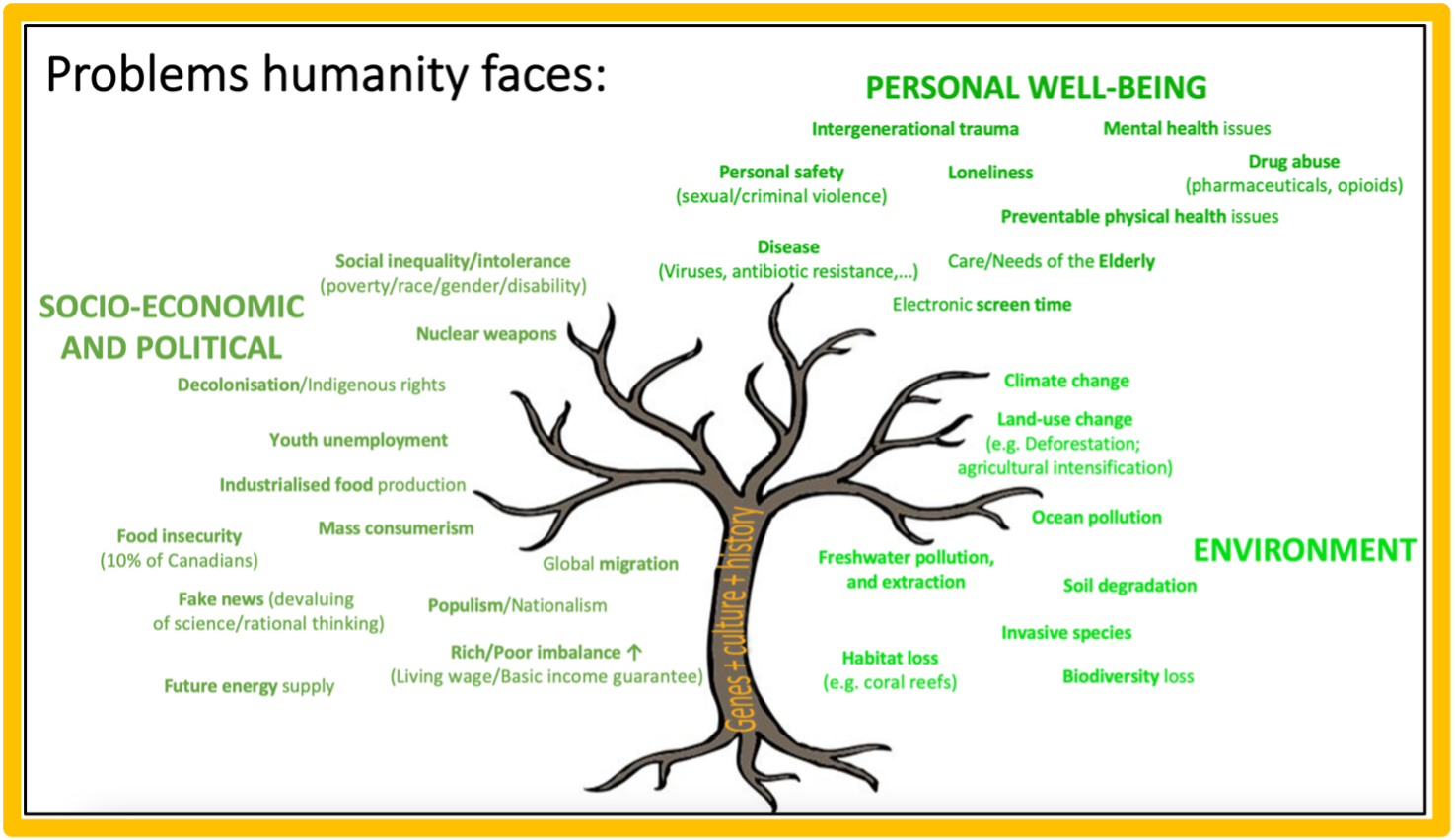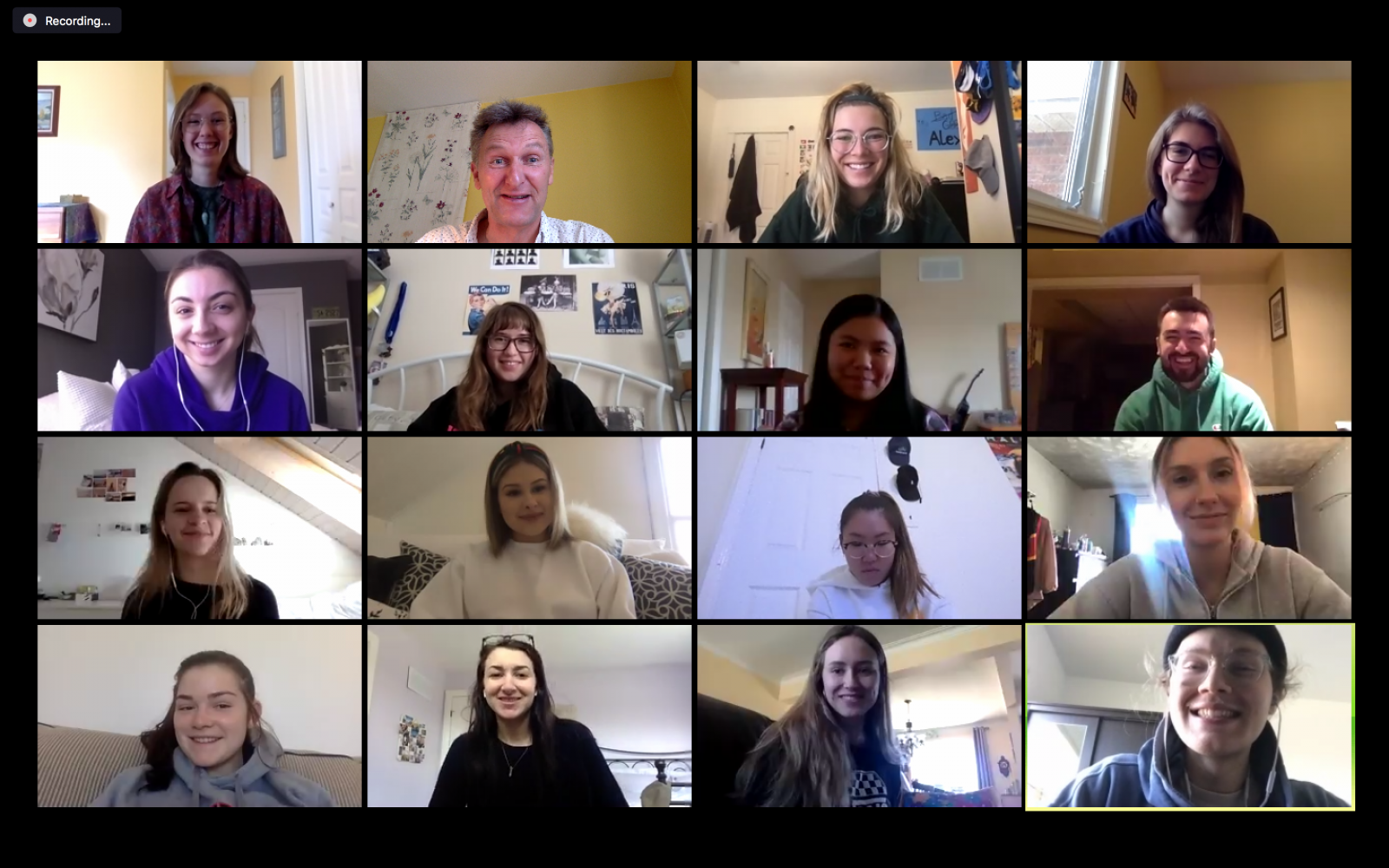
Welcome to the BIOL 510 webpage for Winter 2020 version of this course which was subtitled:
The Biology of Sustainability: Linkages to buddhist and indigenous philosophical perspectives
This ecology course is aimed at identifying and critiquing potential mechanisms by which our civilization could most effectively move toward more sustainable living. Biology can explain current environmental sustainability issues, but is also at the fundamental root of their underlying causes – human behaviour. Therefore, the biology of sustainability incorporates biogeochemical, ecological, economic, social, genetic, and philosophical features and constraints. Each iteration of the course will focus on a unique specific thematic question related to at least some of those components.
The principal question that the 2020 course will address is:
What conceptual linkages between Biology and the philosophical perspectives of Buddhism and indigenous cultures would be most useful in promoting sustainable living?
This course is for final year undergraduates and is specifically aimed at enhancing their capacities for critical thinking, intelligent open discussion, group work, and independent learning. Emphasis will be on interactive discussions and student-led seminars in which participants will have ample opportunities to explore, analyze and synthesize scientific information, to learn how the scientific process works, to speak and write effectively, and to develop their understanding of the philosophies underlying human behaviour and how they relate to global change issues, and the sustainability of our current civilisation. Students will lead informal seminar discussions on some component of this theme that is of particular interest to them. The 2020 course will be largely focussed on reading and discussion of biology professor David Barash's 2013 book Buddhist Biology. Ancient Eastern Wisdom meets Modern Western Science, but will also include a substantial North American indigenous component including associated readings and activity exercises/workshops.
Learning outcomes:
By the end of this course, the student should be able to:
- Critically assess the constraints (ecological, economic, social, behavioural and political) that underlie society’s current responses to global change issues
- Discuss, explain, and critique the similarities and differences in fundamental philosophical concepts between contemporary Buddhism and Indigenous cultures that relate to Biology and Sustainability
- Formulate clear, original, challenging, and concise thematic questions from study reading material that are likely to lead to focussed and intellectually probing seminar group discussions, student-led seminar topics or short essay writing pieces
- Search, critically assess, and synthesize primary and secondary literature in the natural and social sciences
- Develop and present a cohesive, original, synthesis essay on the potential of contemporary Buddhist and Indigenous philosophical perspectives to promote more sustainable living
Professor: Paul Grogan
Seminar times: Mondays 13.00; Wednesdays 11.30
Location: Room 3112 Biosciences building
Calendar: Sessions are 1.5 hours
Assessment:
15% Active participation in discussions (questions, comments, suggestions)
15% Seminar written questions
30% Seminar
40% Synthesis essay (10% outline; 30% final submission)
Schedule:
|
Date |
Topic |
Convenor |
Reading |
|---|---|---|---|
|
January 6th |
Course introduction |
Paul |
|
|
January 8th |
Discussion: Video (Surviving Progress) |
Paul |
Surviving Progress (Documentary film) |
|
January 13th |
Sustainability: What can Biology tell us about our future, and how ought we to live? PART 1
|
Paul |
Grogan, P. 2013. Our Anthropocene Future - What can biology tell us? Free Inquiry. February/March issue. Vol. 32(2):16-19. |
|
January 15th |
Sustainability: What can Biology tell us about our future, and how ought we to live? PART 2 |
Paul |
Robinson D., Hill, J et al. 2019. Rethinking the Practice and Performance of Indigenous Land Acknowledgement. Canadian Theatre Review, Vol. 177: 20-30. |
|
January 20th |
Is the incorporation of values from belief systems other than one’s own necessary to attain a more sustainable future? |
Caitlin Neapole |
Chapter 1. |
|
January 22nd |
How can you be your best self without being yourself? |
Quinn Curran |
Chapter 2a (-midway p44). |
|
January 27th |
Can we significantly shift our focus from self-centered to sustainable living? |
Alicia Litwinczuk
|
Chapter 2b. |
|
January 29th |
How might our reluctance to acknowledge and accept the inevitability of universal decay in all things be holding us back in our pursuit of sustainable living? |
Andrew Clifford |
Chapter 3a (- last para p70). |
|
February 3rd |
If the existence of Homo sapiens is impermanent, is there a purpose in promoting sustainability? |
Victoria Jay |
Chapter 3b. |
|
February 5th |
What aspects of connectedness should we emphasize to achieve more sustainable living? |
Isabella Honess |
Chapter 4a (-midway p. 96). |
|
February 10th |
What aspects of disconnectedness do we need to highlight and change in order to live more sustainably? |
Shannon Marshall |
Chapter 4b. |
|
February 12th |
Promoting ethical living: why is evolution by natural selection a terrible thing to learn from? |
Sofia Marcuzzi |
Chapter 5a (-midway p123). |
|
February 17th |
READING WEEK – No class |
|
|
|
February 19th |
READING WEEK – No class |
|
|
|
February 24th |
For sustainability, is there any point in individually being compassionate? |
Maddy Pellman |
Chapter 5b. |
|
February 26th |
How can the karma concept be emphasized to urge institutions to take more sustainable action? |
Alex Rudiak |
Chapter 6a (-top of p145). |
|
March 2nd |
How can karma be usefully applied to promote sustainable living? |
Yumi Kim |
Chapter 6b. |
|
March 4th |
Is our most fundamental sustainability problem that we always want more?
|
Natalie Chaput |
Chapter 7a (-top of p171).
Camus, A. 1942. The Myth of Sisyphus |
|
March 9th |
How can understanding the negative impacts of evolution help us to build a more sustainable future? |
Tom Savas |
Chapter 7b. |
|
March 11th |
How can we use Indigenous philosophies to help create more sustainable communities?
|
Hannah Utom |
Charles, M. 2015. Creating a Common Memory for a Deeply Traumatized Nation. Camilleri, C. 2016. Indigenous Family Structure – It’s Complicated. Insights Magazine. |
|
March 16th
Note this session will be in Room 3110 |
KAIROS Blanket Exercise - an interactive learning experience that teaches the Indigenous rights history we are rarely taught. By engaging on an emotional, physical, spiritual and intellectual level, the Blanket Exercise effectively educates and increases empathy and encourages collaboration. CANCELLED due to COVID outbreak |
Laura Maracle |
Indigenous Cultural Safety Coordinator, Four Directions Indigenous Student Centre, Queen’s university |
|
March 18th |
Essay preparation – No class |
|
|
|
March 23rd |
Has any of your learning in this course been significantly helpful to you in coping with the COVID global crisis?
|
Paul - online seminar |
Hollenstein, T. 2020. Regulating Emotions in a COVID-19 World. The Medium. |
|
March 25th |
|
Paul available for one-on-one consultation |
|
|
March 30th (Monday 13.00) |
What teachings from Indigenous cultures can aid in rekindling society’s relationship with nature and ultimately move us towards sustainability? |
Angeline Emmott - online seminar |
Kimmerer, R. W. 2013. The Honourable Harvest. pp. 175-190 in Braiding Sweetgrass. Milkweed editions |
|
April 1st (Wednesday 11.30) |
Final Synthesis |
Paul - online seminar |
|

Last Updated: 25 June, 2020
